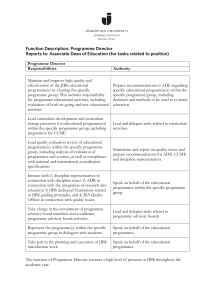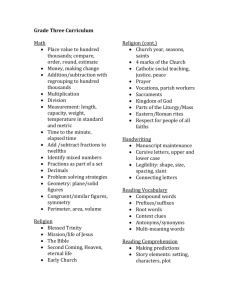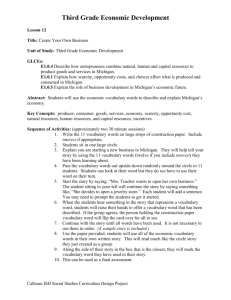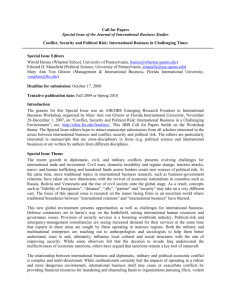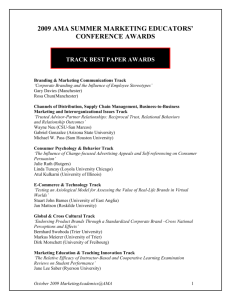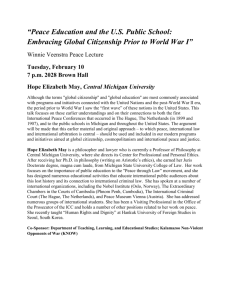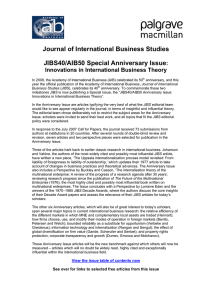Scholarship and Publishing: Are there best Practices?
advertisement
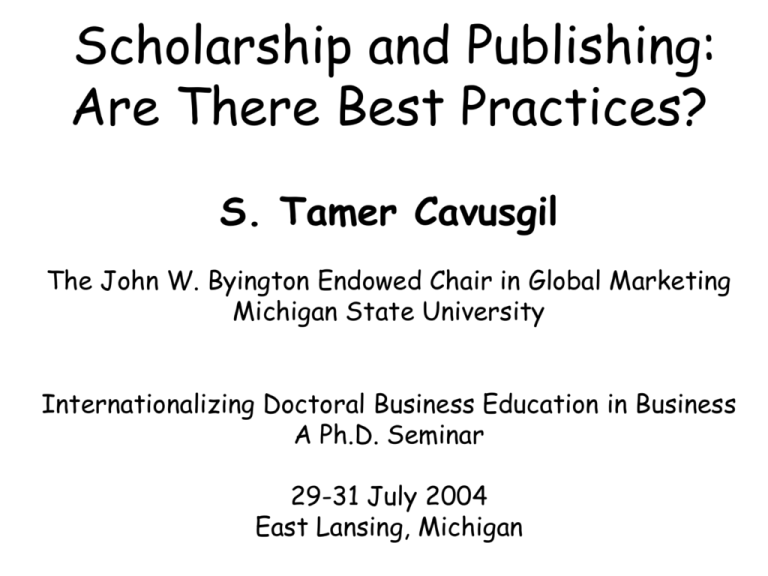
Scholarship and Publishing: Are There Best Practices? S. Tamer Cavusgil The John W. Byington Endowed Chair in Global Marketing Michigan State University Internationalizing Doctoral Business Education in Business A Ph.D. Seminar 29-31 July 2004 East Lansing, Michigan An Art that can be Mastered • Just as in teaching, there are skills in successful publishing • Can learn from the masters, as well as from your own experiences • “Luck is the residue of planning, preparation, and discipline” • Crafting manuscripts for publication should be rewarding in itself; need to “enjoy the process!” Target Suitable Journals Character of publication outlets varies greatly: • Topical coverage • Empirical vs. qualitative papers • Managerial vs. academic focus • Refereed vs. open submission vs by invitation • Target audience/readership profile • Acceptance rate • Frequency of publication… Do this BEFORE you…! • Have your methodology reviewed prior to collecting data • Decide on a target outlet before you write the paper • Peruse recent issues of the target journal to gather impressions of length, formatting, etc., before submission • Have your manuscript reviewed before you submit it to a journal Knowing Where to Submit… Academy of Management Review Academy of Management Journal Advances in International Marketing (Elsevier) Asian Journal of Marketing (Singapore) Business Horizons (Indiana University) California Management Review European Journal of Marketing Industrial Marketing Management (Elsevier) International Business Review (Elsevier; EIBA) International J. of Research in Marketing (EMAC) Journal of Business Research (Elsevier) Journal of the Academy of Marketing Science (AMS) Knowing Where to Submit… (cont.) Journal of Consumer Research (ACR) Journal of International Business Studies (AIB) Journal of International Marketing (AMA) Journal of Macromarketing Journal of Marketing (AMA) Journal of Marketing Research (AMA) Journal of Public Policy and Marketing (AMA) Journal of World Business Long Range Planning (Pergamon) Management International Review (Germany) Sloan Management Journal (MIT) Strategic Management Journal Thunderbird International Business Review (Wiley) JIBS Editorial Team Editor-in-Chief Arie Y. Lewin, Duke University, USA Associate Editors-in-Chief Henk W. Volberda, Erasmus University, The Netherlands S. Tamer Cavusgil, Michigan State University, USA Donald Lessard, Massachusetts Institute of Technology, USA Joan Enric Ricart, IESE Business School, Spain Jiing-Lih Farh, Hong Kong University of Science & Technology, PR China Departmental Editors Economics, Finance and Accounting Raj Aggarwal, Kent State University, USA Tarun Khanna, Harvard Business School, USA Jose Manuel Campa, IESE Business School, Spain Bernard Yin Yeung, New York University, USA Marketing, Consumer Behaviour and Supply Chain Management G. Tomas M. Hult, Michigan State University, USA Guliz Ger, Bilkent University, Turkey Business Dynamics and Strategy J. Myles Shaver, University of Minnesota, USA Brian Silverman, University of Toronto, Canada Nicolai Juul Foss, Copenhagen Business School, Denmark Pankaj Ghemawat, Harvard University Business School, USA Organization and Management Anand Swaminathan, University of California, Davis, USA Charles Galunic, INSEAD, France Terri Scandura, University of Miami, USA Culture, Conflict and Cognition Kwok Leung, City University of Hong Kong, PR China Rick Larrick, Duke University, USA International Political Economy and Comparative Capitalism Lorraine Eden, Texas A & M University, USA Mary A. O'Sullivan, INSEAD, France Entrepreneurship and New Ventures Phil Anderson, INSEAD, France Mike Lubatkin, University of Connecticut, USA and EM Lyon, France Strategic HR and Industrial Relations Mari Sako, Saïd Business School, University of Oxford, UK Mary Ann Von Glinow, Florida International University, USA Technology and Innovation Tom Murtha, University of Minnesota, USA JIBS and JIM • Journal of International Business Studies is published quarterly by the Academy of International Business; an association of 3,000 professionals worldwide • Journal of International Marketing is published quarterly by the American Marketing Association, an association of 25,000 professionals • Journal of International Business Studies is guided by an editor, associate editors, departmental editors, and editorial board (~40), and ad hoc reviewers (~300) JIBS and JIM (cont.) • Annual submissions are over 300 (JIBS) and 100 (JIM) • About 20 percent are desk rejected • About 20 percent are asked to revise • About 10% (JIBS) / 18% (JIM) are eventually published • Moving toward electronic manuscript handling JIBS Domain is IB including… • Multinational and transnational business activities, strategies and managerial processes that cross national boundaries • Joint ventures, strategic alliances, mergers and acquisitions • Interactions of such firms with their economic, political and cultural environments JIBS Domain is IB including (cont.) •Cross national research involving innovation, entrepreneurship, knowledge based competition, judgment and decision making, bargaining, leadership, corporate governance and new organizational forms •Inter-disciplinary contributions, challenging the paradigms and assumptions of single disciplines or functions, are especially welcome JIM Daniel C. Bello EDITOR Diana Zaharieva ASSISTANT TO THE EDITOR Editorial Review Board G. Tomas M. Hult Michigan State University Saeed Samiee University of Tulsa Lyn S. Amine St. Louis University Subhash C. Jain University of Connecticut Catherine Axinn Ohio University Johny K. Johansson Georgetown University Bodo B. Schlegelmilch Vienna University of Economics and Business Administration Paul W. Beamish University of Western Ontario Kostas Katsikeas Cardiff Business School Jean J. Boddewyn Baruch College Warren J. Keegan Lubin School of Business Muzaffer Bodur Bogazici University, Istanbul Gary A. Knight Florida State University Frank Bradley University College, Dublin Masaaki Kotabe Temple University Roger J. Calantone Michigan State University Philip Kotler Northwestern University S. Tamer Cavusgil Michigan State University V. Kumar University of Houston Michael R. Czinkota Georgetown University Tage Koed Madsen Odense University Adamantios Diamantopoulos Loughborough University Naresh K. Malhotra Georgia Tech Institute of Technology Susan P. Douglas New York University Lars-Gunnar Mattsson Stockholm School of Economics Dale Duhan Texas Tech University Hans Mühlbacher Universität Innsbruck Hubert Gatignon INSEAD Aysegül Özsomer Koç University Robert T. Green Thammasat University, Bangkok Jaqueline Pels Universidad Torcuato Di Tella David Griffith Michigan State University Nigel F. Piercy Warwick Business School Hartmut Holzmüller Universität Dortmund John K. Ryans Kent State University John Hulland University of Pittsburgh Bernd Schmitt Columbia University Jagdish N. Sheth Emory University Aviv Shoham University of Haifa Barbara Stöttinger Vienna University of Economics and Business Administration Nader Tavassoli London Business School Vern Terpstra University of Michigan Hans B. Thorelli Indiana University Jean-Claude Usunier University of Lausanne P. Rajan Varadarajan Texas A&M University Lawrence S. Welch University of Melbourne George S. Yip London Business School Shaoming Zou University of Missouri, Columbia Proper Positioning • Does your paper have a non-ambiguous purpose as primarily: – Empirical – Methodological – Conceptual / thought piece – Replication – Case study – Literature review or meta analysis? • Does it fit nicely with a literature stream? • Does it represent a programmatic evolution? • Does it have a modest, rather than ambitious, promise? (The narrower the better!) New or Novel Contribution? • Fresh insights, explanations • Crystallize thinking • Offer new constructs or conceptualization • Prescriptions for management • Explain industry or executive behavior • Add to a debate Now, the Crafting Part… • Your skill as a story teller: Take the reader through the steps • Don’t be a mystery writer! Convey your message early and simply; grab the reader’s interest • Be meticulous with respect to structure, organization, flow, style, referencing, grammar… • Get help from professional editors to improve readability • Make ample use of tables, charts, illustrations • Is the length commensurate with contribution? Those Gatekeepers! • Until accepted, you have written the paper for 3-4 gatekeepers! • Try to anticipate their potential objections • Acknowledge key contributors to research stream • Be prepared for harsh and inconsistent reviews; don’t take it personally • Rejection is not failure if you learn from it! Discipline in the Revision Process • Invitation to revise: Cause for celebration! • Revision = Success at major journals • Be prompt; revision at a top journal should be a top priority! Top 10 Reasons for Rejection 10. Wrong journal! 9. Topic too trivial 8. Results too obvious 7. Analysis is flawed 6. Measures are weak 5. Inappropriate method 4. Weak empirical support 3. Inadequate conceptualization/theory 2. “Half-baked” ideas 1. Marginal contribution Useful Reading… “From the Editor: Reflections on Research and Publishing,” P.R. Varadarajan, Journal of Marketing, Vol. 60 (October 1996), 3-6. “Guidelines for Conducting Research and Publishing in Marketing: From Conceptualization Through the Review Process,” J.D. Summers, Journal of the Academy of Marketing Science, Vol. 29 (Fall 2001), 405-415.
